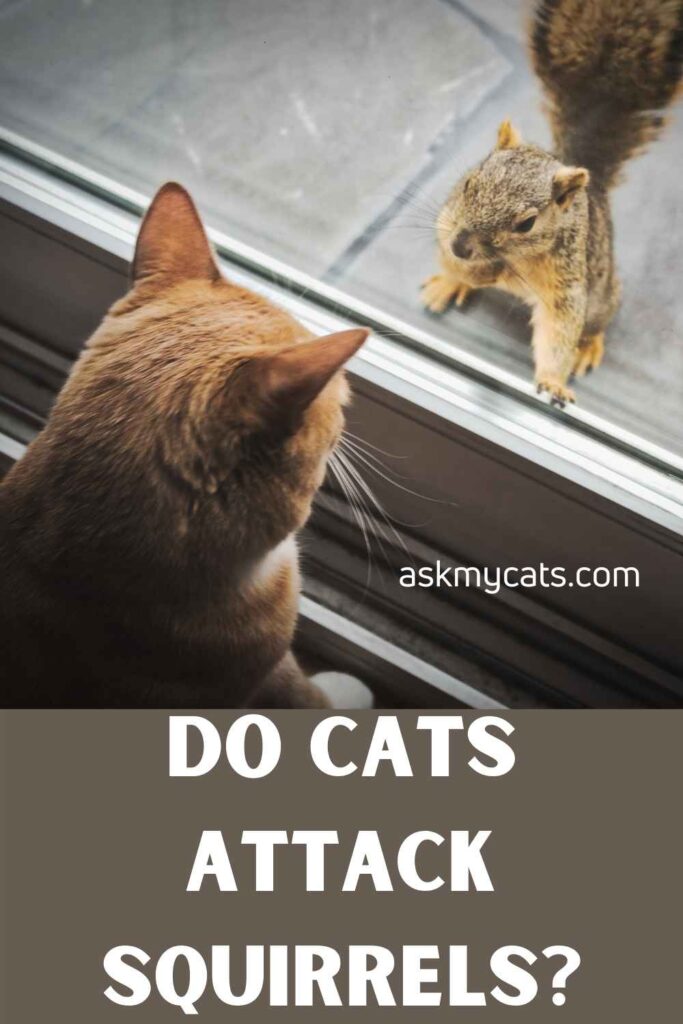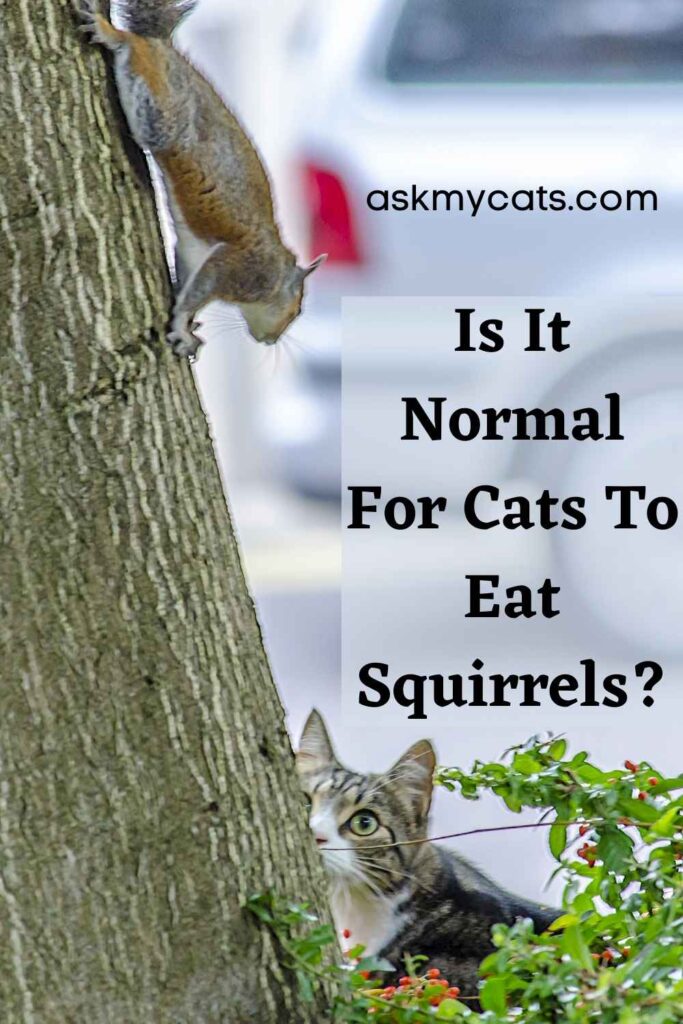Squirrels aren’t typically thought of like a cat’s adversary, but cats are predators by nature. Cats may choose to hunt a squirrel for food or fun if they are given the option.
Although birds, mice, and other small animals are more commonly preyed upon, a cat killing a squirrel is not unheard of.
Most cats would love to hunt down squirrels, along with other animals. They could capture them to play with, but if they’re hungry, they’ll devour them. Squirrels are a natural prey animal for cats, and they are instinctive predators.
Let’s dig deeper into this topic and learn more about the hunting techniques of a cat. You will also get a chance to check if eating squirrels have any side effects on your cat’s diet.


Give Your Cat the Perfect Day
Get the Free Ebook!
Do Cats Eat Squirrels?
Yes. Cats do eat squirrels.
If given the chance, your feline companions will eat a squirrel. Cats are opportunistic hunters who will not turn down the chance to hunt, kill, and consume a squirrel.
Domestic cats that prefer the flavor of animals or who are given a raw diet are more likely to eat their prey.
Feral cats are more likely to go hunting for food, although they mostly scavenge and consume trash and scraps. They’ll consume everything they can get their hands on. This is especially true for domesticated cats, which do not have the same opportunities to search for food as wild cats.
Most household cats hunt for entertainment rather than food. If a cat captures and kills a squirrel, it will leave the dead animal where it died, deliver it to its owners, or consume it.
Cats feeding squirrels has both advantages and disadvantages. The high fluid content of the squirrel carcass also prevents the cat from needing to drink water frequently, which is a plus. If your cat just consumes pet food, it will need to drink more water.
Cat studies demonstrate that when they do hunt, they will catch whichever prey animal is most frequent in their region at the time of year. This implies that squirrels, along with mice and birds, are more likely to become a cat’s major prey in wooded urban environments.
One disadvantage of cats eating squirrels is the chance of disease transmission. If you suspect your cat is eating squirrels, make sure they are up to date on their vaccines. As an extra precaution, get them dewormed regularly.
Furthermore, because domesticated cats aren’t as skilled at hunting as wild cats, they aren’t as excellent at it, and some will only hunt newborn squirrels. They can’t keep up with older squirrels since they’re too swift and smart.
It is healthy for cats to consume fresh prey since it keeps the cat’s gums and teeth in good shape and exercises the animal’s jaw muscles.
Do Cats Attack Squirrels?
Cats can attack squirrels when they want. Cats usually gain confidence from every squirrel they attack, until they become a master in this art of hunting squirrels.

Only experienced hunters will be able to actively capture a squirrel. The majority of squirrels collected are newborns, young adults, or squirrels who have been injured. Unless the cat is a skilled hunter, a healthy adult squirrel will seldom become a hunting prize.
Domestic cats are more likely to like hunting squirrels. They are already fed by their owners, thus it is unlikely for them to kill a squirrel for food unless they appreciate the flavor.
Feral and domestic cats have quite diverse personalities since they live in quite different environments. Domestic cats are frequently cared for by their owners and spend their lives indoors.
Feral cats typically dwell in colonies and seek food to survive. This has a big impact on whether any of them will kill a squirrel.
Feral cats are more prone than domestic cats to kill squirrels for food. This is because they must catch prey to survive. Unlike domestic cats, which have human owners who provide them with food, feral cats must rely on their hunting and scavenging abilities to survive.
Is It Normal For Cats To Eat Squirrels?
Your cat may not hunt and eat squirrels daily, but it may catch and consume a squirrel now and again because it all depends on his mood.

Because adult squirrels are quicker and smarter than most domesticated cats, your cat may catch and consume a newborn squirrel.
If your cat is a skilled hunter, it may have caught a squirrel as its prey. This is a fantastic accomplishment for your kitty. However, once your cat has cooled down after its hunting activities, it is a good idea to inspect it.
Squirrels have sharp claws and chiseled teeth that may readily cause injury if they fight back. Examine your cat’s fur to the skin to ensure there has been no severe damage. Examine the animal for any scratches, bite marks or bare patches of fur.
A cat bringing its victim inside the home isn’t a nice sight. Your cat is fulfilling its natural duty as a mother and teacher by teaching you how to hunt. This is a highly evolved survival tactic that is deeply embedded in a cat’s instincts.
Unfortunately, short of locking your cat indoors, there isn’t much you can do to curb a cat’s hunting tendencies.
Cats are natural predators that will pursue anything that flees. Squirrels have large, bushy tails that make them an appealing target.
A cat would softly snuggle itself into the ground before pouncing on a squirrel to avoid being observed by its victim. The cat will sink as low as it possibly can.
It would then push its ears back and silently observe and judge its prey’s every action. When the cat decides it is time to pounce, it will wag its back end and jump forward, pushing itself as rapidly as it can.
If you see the beginnings of the pursuit, you may stop it by shooing the squirrel away or giving up your cat’s position. Your cat will most likely be preoccupied with its prey and irritated with you for a time, but it will ultimately forget about it when it goes on to something else to do.
The pursuit will begin at this moment. If the squirrel escapes, the cat will most likely go on to another prey. Regardless of whether the cat is successful or not, the pursuit will be swift and ended.
When confronted, squirrels become swift and fierce. They also have razor-sharp claws and fangs that can inflict injury.
Squirrels may also enter into hollows, allowing them to easily avoid cats. A cat that climbs too high will become trapped, and its instincts normally tell them not to do so.
Cats will be more successful on the ground when it comes to hunting. Baby squirrels who have fallen out of their nests or damaged squirrels will be simpler to capture and kill.
Squirrels are expert climbers who can easily ascend trees and other vertical surfaces. Cats will only go as high as they can safely before abandoning the hunt.
When a cat eventually captures a squirrel, it will puncture the squirrel’s neck and rapidly immobilize its target.
Why Do Cats Eat Squirrel Heads?
Cats eat squirrel heads because they are high in nutrition. The brain is high in protein and other nutrients that the cat would benefit from. Furthermore, the cat may get protein from the squirrel’s eyes and tongue. Unfortunately, the squirrel’s mouth can and often does contain a large number of germs.
Cats are drawn to the grey matter and other proteins that make up a squirrel’s brain and cranium. The squirrel’s brain is nutrient-dense, and its eyes and tongue are high in protein.
Furthermore, because squirrels are constantly consuming nuts, their heads are flavored with the numerous things they have consumed recently. This is why cats will not pass up the opportunity to eat a squirrel’s head.
The disadvantage of cats eating squirrel heads and bones is that the bones are a high-risk choking danger to cats, not to mention that a wild squirrel’s mouth is typically loaded with high concentrations of germs, which may be harmful to your domestic cat.
Do Squirrels Carry Diseases To Cats?
Yes, squirrels may transfer illnesses to cats since they are zoonotic animals, which means they may carry and transmit a variety of diseases.
If your cat eats a squirrel, it is a danger of contracting one of these illnesses, becoming unwell, and maybe dying.
When compared to a wild animal, your domesticated cat’s immune system will be feeble. Plague, brain worms, typhus, and other diseases can be transmitted from the squirrel to your cat.
Your domestic cat’s immune system may be unable to combat the illnesses. If your cat ever eats a squirrel, it is best to take it to the vet. If your cat has been unwell, the vet will be able to diagnose it.
Even more harmful, your pet can spread the disease to you and your family, causing widespread illness in the neighborhood. As a result, you should be concerned about your cat eating squirrels.
Can Cats Get Sick From Eating A Squirrel?
There is always the possibility that wild animals consumed by cats are afflicted with sickness or harmful bacterium.
Consuming uncooked, wild meat may result in the transmission of mange and fleas.
There’s also the risk of choking from tiny bones and huge chunks of meat.
While disease transmission is uncommon, cats that regularly ingest squirrels and other animals should be checked for fleas and worms regularly.
How to Stop Cats Killing Squirrels?
You need to give proper training to your pet cat to not harm squirrels or else you need to wait until the cat gets older and his hunting ability diminishes.

1. Increase Play Time
Playing with your cat regularly might help to refocus his hunting impulses. Mental stimulation will assist your cat’s hunting instincts and make him less prone to kill animals.
Toys that mimic the hunting experience, such as feather teasers or toys that move about the room are ideal. These will strengthen your cat’s instincts while decreasing his or her impulse to murder.
2. Maintain A Proper Diet
A well-fed cat is less prone to harm. Hungry cats may frequently murder animals to eat, but providing your cat with a high-quality, full meal will help prevent this.
You might also try giving your cat smaller, more frequent meals throughout the day.
3. Ring The Bell
A bell will reveal your cat’s location and warn animals and birds that danger is around. Cats with a bell on their collar catch 34% fewer animals than cats without a bell.
To avoid strangling if your cat becomes entangled, make sure the collar you purchase has a rapid release mechanism.
4. Restrict Your Cat’s Movements At Night
At night, a cat’s hunting instincts are more active. This is also the time of year when animals and squirrels emerge to eat.
Keeping your cat inside from dark to morning will prevent your cat from locating and killing these creatures.
Frequently Asked Questions
Do Cats Kill Squirrels?
Domestic and feral cats are predatory, which means they will go hunting outside on occasion. Cats hunt and kill a wide range of tiny creatures, including birds, rodents, rabbits, squirrels, reptiles, and even insects. Cats and squirrels are not considered adversaries, but as instinctive predators, cats would kill a squirrel for meals if given the opportunity.
Do Cats Kill Grey Squirrels?
Grey squirrels and red squirrels are both large predators of bird nests, and they may be found in a variety of settings such as parks, urban areas, gardens, and any broad-leaved woods. Domestic and feral cats with wild origins, owls, humans, dogs, and hawks are all predators.
Can A Cat Die From Eating A Squirrel?
Cats kill a tremendous quantity of prey, including mammals and birds, each year, but it is also conceivable that the incorrect prey will kill your cat. Squirrels, for example, can bite or scratch a cat, which may be deadly, particularly if the squirrel is sick with infections and viruses. To reduce their danger of harm, cats weary out their entire prey by chasing them around.
Final Words
If a cat can capture and kill a squirrel, it will devour it. Because baby squirrels are slower and less intelligent, your tamed cat will choose to capture and kill them.
Squirrels are not terrified of cats, although they are cautious of them as they are of larger creatures. Take your cat to the vet if it eats a squirrel.
Squirrels may infect cats with illnesses such as plague, brain worms, typhus, and many more.
If you enjoyed this article then share your thoughts in the comments section below!

I loved your info about cats eating squirrels !! Omg, I’ve had cats over the years and did not know that they liked to eat them…age and protein of brain and eyes ! Luckily, I never had a cat do that…or, at least that I’m aware of. Most of the time they seemed happy enough to not search for them. I DID have a cat that brought the mouse into the house; I followed behind and watched the mouse run around under my bed, luckily the mouse found a way to my light wt. run at the side of the bed, me grabbing it with the run, taking the mouse outside. That was the only incident that I recall…or that I was aware of. This article was very very informative and interesting. Thanks so much for sharing it !
Cooked squirrel meat is an excellent protein source, both for a cat and humans. Cooking the meat will kill bacteria and make it safe to eat. So don’t be afraid to kill squirrel and feed them to your cats, or eat them yourself!
I must differ with you on one point however. Any cat can outrun any squirrel, all things being equal. So over short distances, cats very easily can catch up to a squirrel even if the squirrel may have a short head start.
Mature squirrels share their world with millions of domestic or feral cats. Most mature squirrels have been chased by cats or witnessed cats chasing their fellow squirrels, thus they learn from the experience and can usually avoid capture. But the fact that they successfully avoid capture doesn’t mean the squirrel is superior to the cat. Overall, the cat is a much larger predator, has better weapons to kill with, and runs much faster than a squirrel. Cats can run at up to 30 MPH over short distances. A squirrel might be able to go half that fast at best.
One of the reasons experienced cats DON’T try very hard to actually capture and kill mature squirrels is they have learned through experience that squirrels can bite very hard and scratch them too. Cat’s don’t like to try to capture and kill animals that fight back hard and which are equipped to genuinely hurt the cat. They much prefer killing easier prey that can’t hurt them very easily, such as soft, squishy mice which they can kill with one clean bite. Thus you may see a cat chase a squirrel half heartedly for the fun of the chase but the cat likely isn’t really trying hard to actually capture the squirrel. Thus watching the squirrels beat the cats to the safety of a tree can cause humans to think the squirrel simply is superior to the cat when it truly is the other way around. The cat simply isn’t trying very hard to catch the squirrel but is very content with nothing more than the fun of the chase.